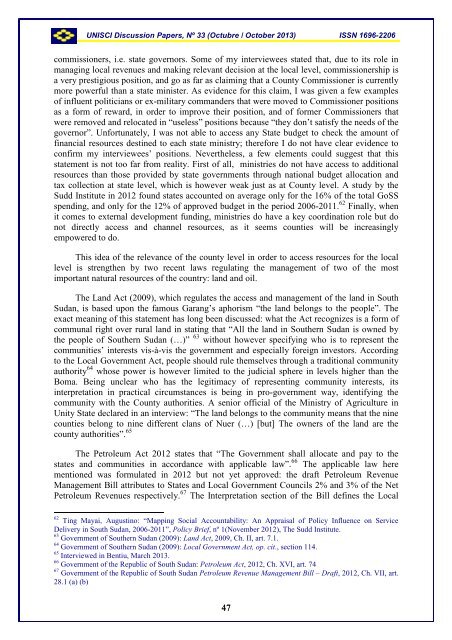UNISCI - Universidad Complutense de Madrid
UNISCI - Universidad Complutense de Madrid
UNISCI - Universidad Complutense de Madrid
Create successful ePaper yourself
Turn your PDF publications into a flip-book with our unique Google optimized e-Paper software.
<strong>UNISCI</strong> Discussion Papers, Nº 33 (Octubre / October 2013) ISSN 1696-2206commissioners, i.e. state governors. Some of my interviewees stated that, due to its role inmanaging local revenues and making relevant <strong>de</strong>cision at the local level, commissionership isa very prestigious position, and go as far as claiming that a County Commissioner is currentlymore powerful than a state minister. As evi<strong>de</strong>nce for this claim, I was given a few examplesof influent politicians or ex-military comman<strong>de</strong>rs that were moved to Commissioner positionsas a form of reward, in or<strong>de</strong>r to improve their position, and of former Commissioners thatwere removed and relocated in “useless” positions because “they don’t satisfy the needs of thegovernor”. Unfortunately, I was not able to access any State budget to check the amount offinancial resources <strong>de</strong>stined to each state ministry; therefore I do not have clear evi<strong>de</strong>nce toconfirm my interviewees’ positions. Nevertheless, a few elements could suggest that thisstatement is not too far from reality. First of all, ministries do not have access to additionalresources than those provi<strong>de</strong>d by state governments through national budget allocation andtax collection at state level, which is however weak just as at County level. A study by theSudd Institute in 2012 found states accounted on average only for the 16% of the total GoSSspending, and only for the 12% of approved budget in the period 2006-2011. 62 Finally, whenit comes to external <strong>de</strong>velopment funding, ministries do have a key coordination role but donot directly access and channel resources, as it seems counties will be increasinglyempowered to do.This i<strong>de</strong>a of the relevance of the county level in or<strong>de</strong>r to access resources for the locallevel is strengthen by two recent laws regulating the management of two of the mostimportant natural resources of the country: land and oil.The Land Act (2009), which regulates the access and management of the land in SouthSudan, is based upon the famous Garang’s aphorism “the land belongs to the people”. Theexact meaning of this statement has long been discussed: what the Act recognizes is a form ofcommunal right over rural land in stating that “All the land in Southern Sudan is owned bythe people of Southern Sudan (…)” 63 without however specifying who is to represent thecommunities’ interests vis-à-vis the government and especially foreign investors. Accordingto the Local Government Act, people should rule themselves through a traditional communityauthority 64 whose power is however limited to the judicial sphere in levels higher than theBoma. Being unclear who has the legitimacy of representing community interests, itsinterpretation in practical circumstances is being in pro-government way, i<strong>de</strong>ntifying thecommunity with the County authorities. A senior official of the Ministry of Agriculture inUnity State <strong>de</strong>clared in an interview: “The land belongs to the community means that the ninecounties belong to nine different clans of Nuer (…) [but] The owners of the land are thecounty authorities”. 65The Petroleum Act 2012 states that “The Government shall allocate and pay to thestates and communities in accordance with applicable law”. 66 The applicable law herementioned was formulated in 2012 but not yet approved: the draft Petroleum RevenueManagement Bill attributes to States and Local Government Councils 2% and 3% of the NetPetroleum Revenues respectively. 67 The Interpretation section of the Bill <strong>de</strong>fines the Local62 Ting Mayai, Augustino: “Mapping Social Accountability: An Appraisal of Policy Influence on ServiceDelivery in South Sudan, 2006-2011”, Policy Brief, nº 1(November 2012), The Sudd Institute.63 Government of Southern Sudan (2009): Land Act, 2009, Ch. II, art. 7.1.64 Government of Southern Sudan (2009): Local Government Act, op. cit., section 114.65 Interviewed in Bentiu, March 2013.66 Government of the Republic of South Sudan: Petroleum Act, 2012, Ch. XVI, art. 7467 Government of the Republic of South Sudan Petroleum Revenue Management Bill – Draft, 2012, Ch. VII, art.28.1 (a) (b)47
















